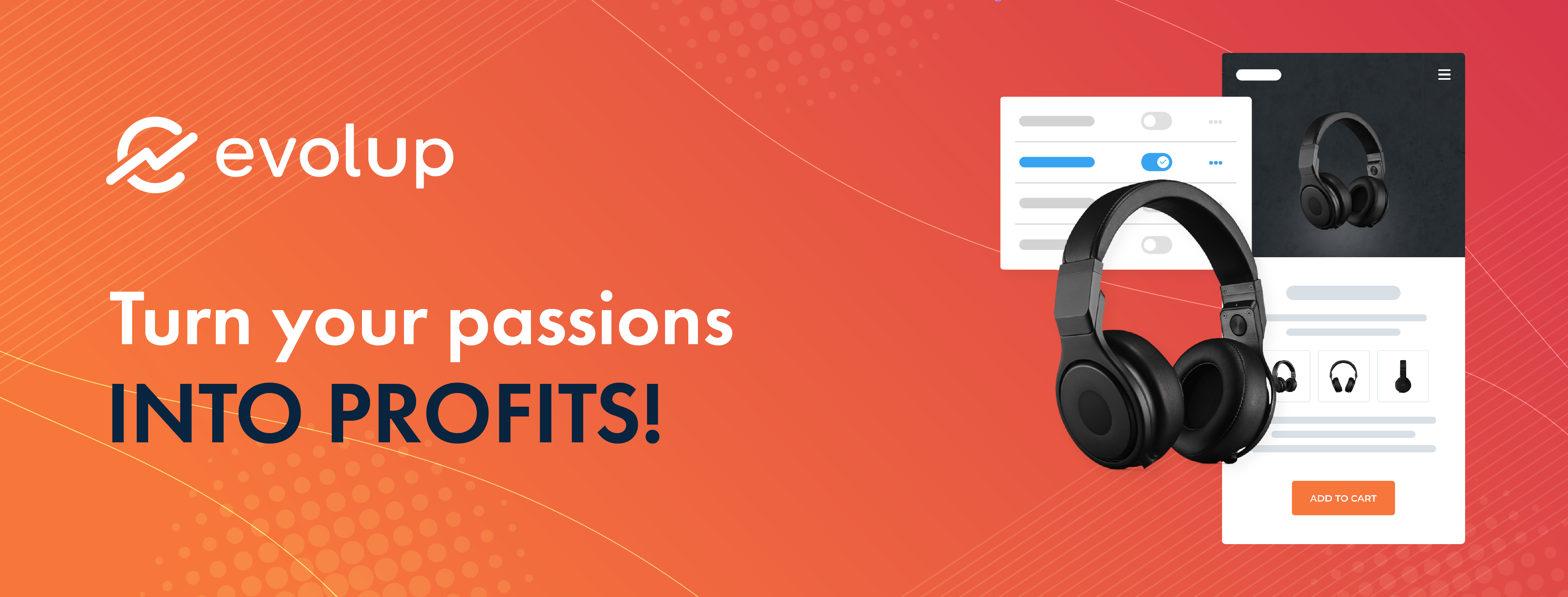Whether a side hustle to earn a bit of extra money or a full-time gig, starting a business from scratch can be an exciting journey, but what if you find yourself without a clear idea to pursue? The lack of a specific concept might seem overwhelming, but it shouldn’t deter you from fulfilling your quest to becoming an entrepreneur and starting your own company.
In this guide, we’ll explain how to kickstart your business venture even when you have no concrete ideas. Discover actionable strategies that can start to ignite your entrepreneurial spirit and lead you towards coming up with the right idea for a winning business!
Table of contents
- What is the best way to come up with potential business ideas when starting your own company?
- What kind of business is easiest to start for first-time entrepreneurs?
- How do you become an entrepreneur after you have an idea for your new business?
- Start your adventure in entrepreneurship and establish your business today!
What is the best way to come up with potential business ideas when starting your own company?
Starting a small business when you have no specific ideas in mind can be challenging but not impossible. Here’s a list of our best tips to help you dream up an exciting new business with plenty of profitability possibilities.
1. Begin with some self-assessment

Photo by Roman Odintsov
Self-assessment is a crucial step in generating a business idea that aligns with your passions, skills, and goals. Start by reflecting on your strengths, interests, skills, and expertise. Identify what you excel at and what brings you joy.
Consider your experiences, both personal and professional, and how they can be leveraged in a business context. Understanding your values and what things motivate you will help you find a purpose-driven concept that resonates with you.
Self-assessment provides clarity and direction, ensuring that your business venture is not only profitable but also fulfilling and sustainable in the long run. It lays the foundation for a business that reflects your authentic self and drives your entrepreneurial success.
2. Research the market
In your research, you should plan to aim to identify industries and sectors of interest and then conduct a thorough market analysis. Study competing businesses in your industry, your target audience, and trends to look for gaps or problems that need solutions. Analyze consumer needs and pain points to create a solution that fills a demand.
Although this step can take a bit of time, it’s well worth it when brainstorming business ideas. You’ll find that market research provides valuable insights into consumer behavior, market dynamics, and competitive landscape, helping you make informed decisions and avoid possible pitfalls.
Understanding the market ensures that your business idea is relevant, competitive, and has the possibility to grow and become profitable, earning more money year after year. It allows you to tailor your offerings to meet customer demands and create a unique value proposition, increasing the likelihood of business success.
3. Harness the power of networking
The ability to network is one of the top characteristics of an entrepreneur and can be a really good tool when it comes to generating a business idea. It exposes you to diverse perspectives, knowledge, and possible collaborations.
Engage in networking events, industry seminars, trade shows, and online communities to interact with like-minded individuals and entrepreneurs. Discuss your interests and goals with others, seek feedback on your ideas, and ask questions to gain valuable insights.
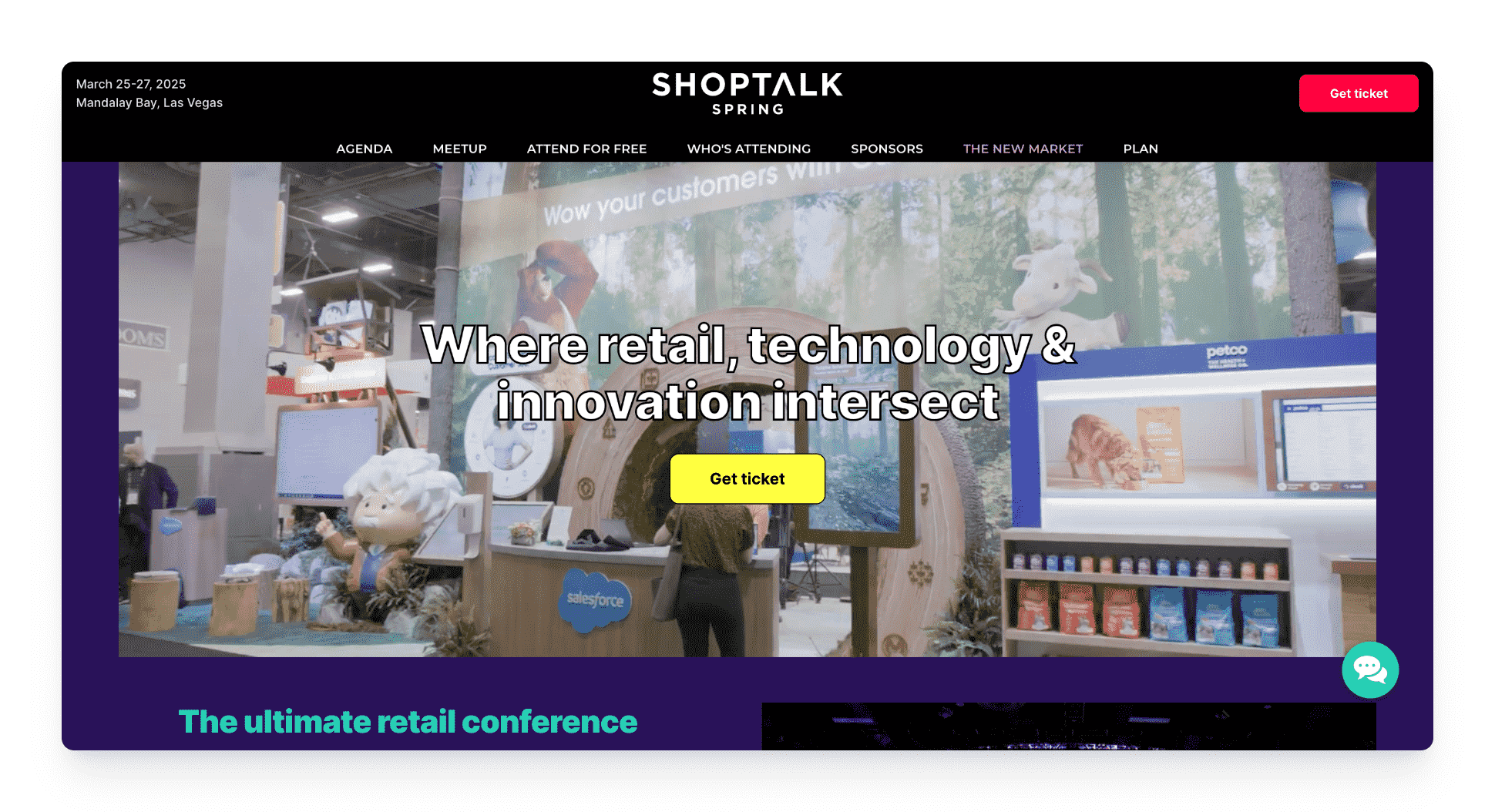
Shoptalk Spring, an annual retail conference held in Las Vegas
Networking introduces you to different industries, business models, and current trends, sparking inspiration and creativity. When you start to build strong relationships with professionals, mentors, and potential partners, you can receive guidance, support, and access to resources and skills that can help refine your business concept and increase its chances of success.
When done strategically, networking with other people and businesses has the power to open doors to opportunities that may not have been available to you otherwise, widening your entrepreneurial horizons.
4. Take a problem-solving approach
A problem-solving approach is a strategic method to generate a business idea that addresses real needs in the market. Start by identifying common pain points or challenges faced by consumers or businesses. Analyze these problems carefully and brainstorm promising solutions.
By focusing on solving a problem, you can start to create a clear value proposition for your small business, making it relevant and compelling to possible customers. This approach guarantees that your idea meets a genuine demand, increasing its chances of success.
What’s more, problem-solving ideas tend to have good sustainability over the long term, as they cater to ongoing needs, making them more resilient in the ever-changing market landscape.
5. Brainstorm with other people
Sometimes two (or more) heads really are better than one!
Brainstorming with other people is a good way to generate a business idea, as it brings diverse perspectives, insights, and creativity to the table. Gather a group of individuals with different backgrounds, expertise, and interests. Encourage open and free-flowing discussions, allowing everyone to share their thoughts and ideas without judgment.
Collaborating with others can help spark inspiration, identify potential blind spots, and bring forth unique solutions to problems. It fosters a sense of camaraderie and support, making the idea-generation process more enjoyable and productive.
Brainstorming with a team or seeking input from family and friends also increases the likelihood that you’ll find innovative and viable business concepts that can withstand market challenges and resonate with a broader audience.
6. Seek inspiration
Seeking inspiration is crucial to foster creativity and generate innovative business ideas. Explore various sources such as books, podcasts, TED talks, industry news, and success stories of entrepreneurs. Attend workshops, seminars, and conferences to learn from experienced professionals and gain fresh perspectives.

Future Commerce, a weekly ecommerce podcast
In addition, feel free to engage in activities unrelated to your field to stimulate your imagination. Exploring your creativity and getting inspired can help you see things from different angles and connect seemingly unrelated concepts, leading to unique and disruptive ideas. It prevents idea stagnation and encourages continuous growth.
Seeking inspiration broadens your horizons, ignites your passion, and propels you towards finding a business idea that’s both meaningful and impactful.
7. Determine your business model
It may seem a bit early in the game to think about business models when you haven’t yet solidified an idea for your new business, but stay with me!
At its core, a business model constitutes a blueprint for income generation. By exploring marketing strategies and evaluating the advantages and disadvantages of different legal structures, such as an LLC or sole proprietorship, you can effectively choose the most suitable concept to pursue.
For instance, envisioning yourself as a sole operator might lead you to opt for a small, easily manageable online business, or you might instead see yourself starting a larger project from the very beginning and plan to launch a big company. The key lies in making sure that the chosen model is a good match for your specific business objectives as well as the money you have available in your budget when you consider the costs of investing in your venture.
Defining your business model early on ensures that your ideas align with a sustainable and scalable framework. It clarifies how your idea will generate revenue, satisfy customers, and maintain a competitive edge. This process also helps you identify possible snags, refine your value proposition, and ultimately increase the likelihood of turning your ideas into a successful and profitable business.
8. Build an audience around your area of interest
Is there something you’re already passionate about but don’t know how to turn that interest into a viable business? You may very well benefit from working on building an audience around that particular area of interest.
Building an audience first is a strategic approach that can significantly assist in the process of coming up with new business ideas for students as well as other kinds of blossoming entrepreneurs, regardless of industry. It allows you to gain valuable insights and create a more successful and customer-centric venture by making it possible for you to do the following:
- Understand market needs: Interacting with your audience allows you to start to identify their pain points, preferences, and unmet needs, providing you with a foundation for generating relevant and in-demand business ideas.
- Validate ideas: Engaging with your audience early on lets you test and validate your business concepts, ensuring that your offerings resonate with potential customers.
- Create tailored solutions: With audience feedback, you can fine-tune your ideas and work on developing unique products or services that precisely meet their expectations, enhancing the chances of success.
- Build brand loyalty: By connecting with your audience and addressing their concerns, you can foster brand loyalty even before your business is fully operational.
- Secure early adopters: A pre-existing audience can serve as an initial customer base, jumpstarting your business and attracting early adopters.

Into the Gloss, the beauty blog created by Emily Weiss before launching makeup and skincare brand Glossier
What’s more, with the plethora of platforms and social networks available today, this strategy is easier than ever to implement: write blog posts, create videos on YouTube or TikTok, launch a podcast, or use any combination of methods.
9. Don’t be afraid to pivot if needed
Embracing the possibility of pivoting is essential in the process of generating a successful business idea. Fear of pivoting can stifle creativity and prevent you from exploring new opportunities. Being open to change allows you to adapt to feedback and evolving trends.
Pivoting is a sign of resilience and a willingness to learn from failures. It enables you to refine and improve your initial concept based on real-world insights. Remember that many successful businesses started with different ideas but achieved greatness through pivoting.
Embracing the potential for change empowers you to be agile, innovative, and responsive to customer needs, increasing your chances of finding a winning business idea.
10. Consider creating a minimum viable product (MVP)
An MVP is a basic version of your idea with just enough features to test its viability and gather feedback from people who would be likely to use it.
By creating an MVP, you can quickly and cost-effectively validate whether your business concept solves a real problem or fulfills a need. Feedback from early users helps you pinpoint possible improvements, refine your idea, and avoid investing time and resources into a product or service offering that may not meet customer expectations.
An MVP allows you to make informed decisions and build a business idea based on real-world insights and demand.
11. Continue to learn
Regardless if you’re still searching for an amazing business idea or already have one in mind, it’s absolutely vital that you never stop learning, as it will allow you to stay up to date with the latest trends, industry developments, and emerging technologies.
Continuous learning exposes you to diverse perspectives, new concepts, and innovative solutions, expanding your knowledge base. It also helps you find untapped opportunities and gaps in the market. In addition, staying open to learning can make it easier for you to discover different business models, marketing strategies, and customer preferences, helping you make informed decisions.
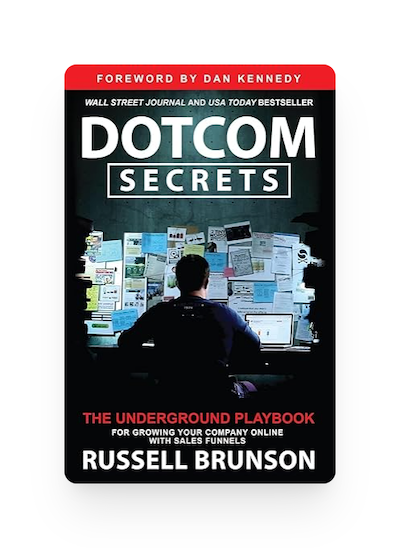
Dotcom Secrets, a book by Russell Brunson that focuses on the importance of well-designed sales funnels
By staying curious and receptive to new ideas, you can work on refining and adapting your thinking, enhancing the quality of your business idea. Continuous learning fosters adaptability, resilience, and creativity, enabling you to stay ahead of the competition and develop a business concept that’s relevant, competitive, and poised for success in a dynamic and ever-changing business landscape.
What kind of business is easiest to start for first-time entrepreneurs?
Ready to unleash your entrepreneurial potential? To help inspire you, here’s a list of some of the easiest types of businesses to start, particularly if you’re looking for online business ideas.
Explore these various concepts to prompt your entrepreneurial journey towards building a successful business, even if you currently find yourself without a specific plan.
Ecommerce
Ecommerce refers to the buying and selling of goods and services online. It involves conducting transactions through websites, mobile apps, or other digital platforms and is one of the easiest kinds of businesses to launch today.
Starting an ecommerce business offers numerous advantages for aspiring entrepreneurs. It provides a global reach, allowing businesses to access a vast customer base beyond geographical limitations and sell their offerings all around the world.
What’s more, the money required to start an ecommerce business is generally much lower compared to traditional brick-and-mortar stores. Ecommerce is also scalable, allowing businesses to grow as demand increases.
Of course, if you want to start to get involved in ecommerce, you will need to be sure that you have a top-notch online store.... And for that, WiziShop, the all-in-one ecommerce solution has got you covered!
With the WiziShop ecommerce platform, you will be able to create a high-quality storefront that best suits your vision in no time by selecting from a wide range of design themes and using our easy-to-use drag-and-drop system. Whether you plan to list and sell physical or digital products, adding them to your website will be a breeze with WiziShop’s artificial intelligence.
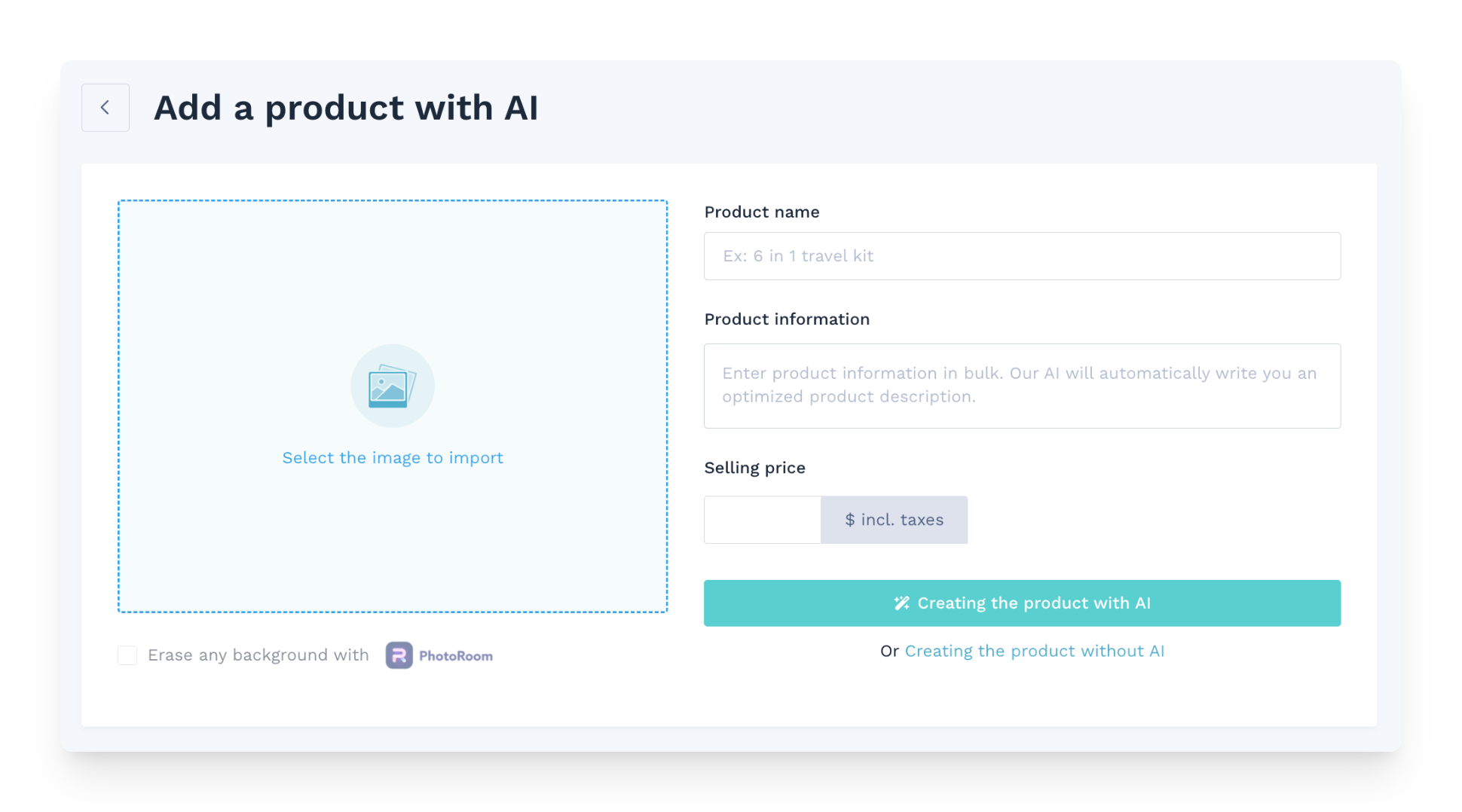
WiziShop takes care of all the technical SEO aspects for your store, which will free you up to focus on other things related to your business, and features 400+ pre-integrated tools to help boost your conversions.
In addition, you can learn ecommerce from our library of video tutorials and get helpful advice from the Business Coaches at your service to assist you with any questions you might have, big or small, pertaining to your online store, in order to put you on the path to success when becoming a business owner!
Feel like your writing skills need a bit of polishing? Take advantage of the platform’s powerful AI to make time-consuming content creation a thing of the past. WiziShop’s revolutionary tool allows you to create high-quality product descriptions, blog posts, meta descriptions and titles, translations, and other types of text content in mere seconds.
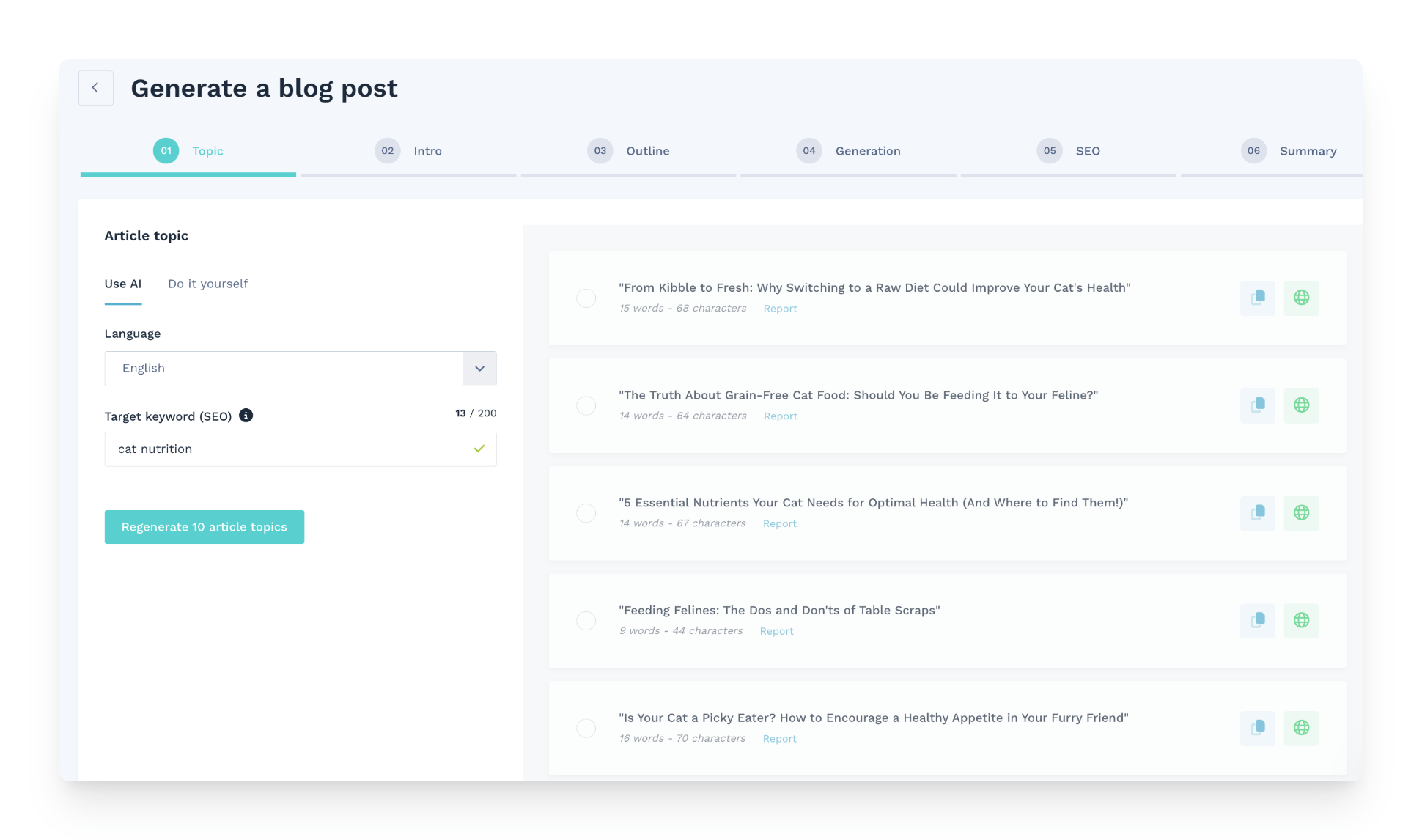
Start your new entrepreneurial journey today and enjoy a 7-day free trial with WiziShop to see why it’s the best online sales solution available!
Try WiziShop free for 7 days
THE EASIEST NO-CODE ECOMMERCE SOLUTION✅ No credit card required
✅ Access to all features
✅ No commitment
Dropshipping
Love the idea of selling items online but don’t have the space to store products and don’t want to worry about shipping orders to shoppers? Dropshipping may be the perfect solution!
Dropshipping is a retail fulfillment method where an online store doesn’t keep the products it sells in stock. Instead, when a customer places an order, the store purchases the item from a third-party supplier who then ships it directly to the customer. This means the retailer doesn’t need to handle inventory or manage shipping logistics, making it a business model with generally lower costs and risk.
Dropshipping is attractive to many people looking to start a small business on the web. It requires minimal upfront investment since you don’t need to purchase inventory beforehand. Furthermore, it offers a wide range of products to sell without worrying about storage space. It also gives you the flexibility to test different products and niches without committing to large quantities.
This type of business is especially great if you love to travel and are thinking of becoming a digital nomad. Dropshipping allows you to operate from anywhere with an internet connection, providing location independence. While this model can be competitive, with the right marketing strategies and product selection, it can be a lucrative venture with the potential for a scalable and profitable online business.
Affiliate marketing
Affiliate marketing is a performance-based online business model where affiliates (individuals or companies) promote products or services of other companies and earn a commission for each sale or lead generated through their referral. Affiliates use unique tracking links to track their referrals and receive credit for successful conversions.
Starting an affiliate marketing venture is super simple and ideal for a blossoming online entrepreneur for several reasons. It requires little to no initial investment, as, similar to with dropshipping, you don’t need to create or own the products. What’s more, it offers a wide range of products and niches to promote, giving you the flexibility to choose what best aligns with your interests and audience.
In addition, affiliate marketing allows you to leverage existing platforms, such as websites, blogs, or social media, to reach potential customers. Moreover, the potential for passive income is significant, as you can earn commissions even when you’re not actively promoting.
If this kind of business sounds particularly enticing to you, consider simplifying the path to affiliate marketing success by creating an affiliate website with the WiziShop Group’s Evolup platform.
Powered by artificial intelligence, Evolup allows you to create your affiliate store automatically, resulting in a professional, high-quality site in just a few clicks!
Then, simply choose the products from your preferred affiliate program(s), such as Amazon Associates, or any other program, add your affiliate links, and get ready to watch those commissions roll in.
Test the Evolup platform yourself with a 7-day free trial!
How do you become an entrepreneur after you have an idea for your new business?
After you have a compelling concept in mind for your future venture, here are the steps you can plan to take to start to transform your idea into a fully fledged business.
1. Perform market research
I know, I know... You already researched the market when brainstorming what type of small business to create, so is it really necessary to do it again?
YES.
At this point in your journey in becoming a successful entrepreneur, you’ll need to avail of market research to narrow down your niche, learn about the people in your target market, and hone in on the exact type of product or service you wish to sell.
This activity is crucial when launching a new business as it provides essential insights into the market, target audience, competition, and overall feasibility of your business concept. It helps you make informed decisions, minimize risks and unnecessary costs, and optimize your business strategy for success.
During this step, you’ll want to create a buyer persona, which involves evaluating your ideal shopper and determining their characteristics, such as demographics, preferences, and behaviors.
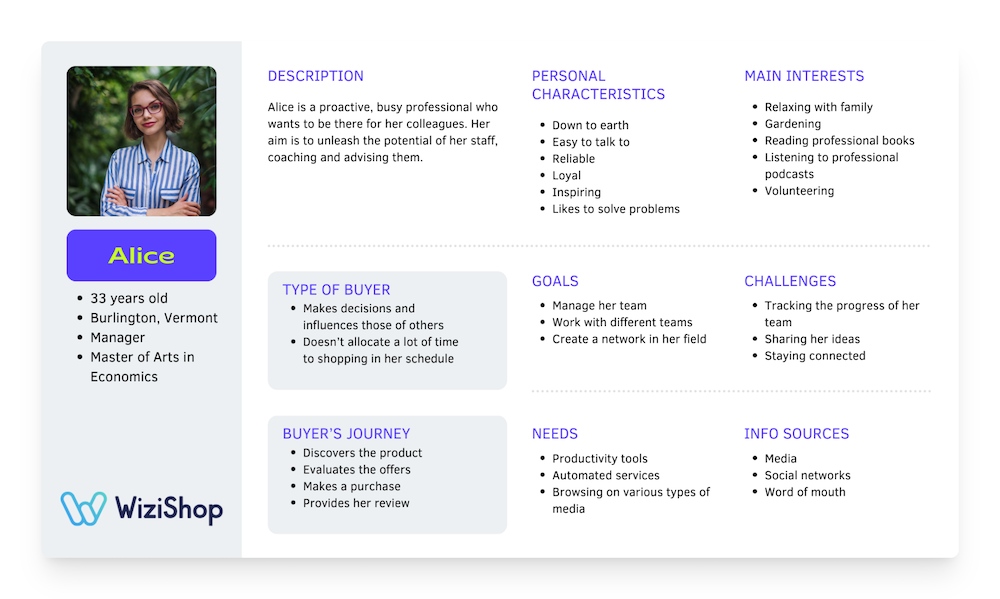
Example of a buyer persona
You might also wish to conduct surveys to gather feedback directly from your target audience about their needs, pain points, and preferences and offer samples or prototypes to a small group of people to assess their response and get their opinions.
Doing a competitive analysis is another key element of this step. For this, you’ll analyze your competitors’ offerings, strengths, weaknesses, and market positioning to spot opportunities and possible threats.
Finally, examine the data that you have collected to draw meaningful conclusions and make data-driven decisions. Use the research findings to validate whether your business idea is viable and if there’s a real demand.
2. Decide on a business name
Choosing the right business name is of utmost importance as it plays a pivotal role in shaping your brand identity, creating a strong first impression, and leaving a lasting impact on customers. A well-chosen name can differentiate your business from competitors, attract your target audience, and foster brand recognition and loyalty.
A great business name should do the following:
- Reflect your brand: The name should align with your brand values, mission, and offerings. It should evoke a positive emotion or convey the essence of your business when people hear or see it.
- Be easy to remember and spell: A simple and easy-to-remember name helps customers recall and share your business with others.
- Stay away from trends: Choose a name that stands the test of time, as trendy names may quickly become outdated.
- Be unique: Stand out in the market by selecting a distinctive name that sets you apart.
- Allow for future scalability: Consider if the name allows room for future expansion into different products or services.
- Be culturally sensitive: Be aware of potential cultural connotations that may be offensive or inappropriate in certain regions.
When you create a site with WiziShop, you can also avail of the solution’s AI to pick a business name. Simply select your language and provide your niche or tagline, and the tool will generate a list of names to consider for your store!
Once you have a business name in mind, you’ll want to be sure to verify that the name isn’t already in use or trademarked by another business to avoid legal issues. Don’t forget to also check to see if the corresponding domain name is available for your website and if the handle (or a slight variation) is available on social media networks.
3. Work on your branding
The branding for your future business is crucial, as it creates a unique identity, builds credibility, and helps establish an emotional connection with your target audience. A strong brand communicates your values, mission, and the promise of what your business offers, setting you apart from competitors and fostering brand loyalty.
There are numerous elements involved in branding:
- Brand identity: Clearly articulate your brand’s personality, values, and purpose. Understand your target audience and how you want them to perceive your business.
- Brand logo: Design a visually appealing and relevant logo that represents your brand, is memorable, and can be easily recognized.
- Brand messaging: Craft consistent and compelling messaging that conveys your brand’s story and resonates with your audience.
- Brand colors and fonts: Select a color palette and fonts that align with your brand identity and use them consistently across all materials.
- Brand voice: Determine the tone and style of communication that reflects your brand’s personality and use it consistently in all interactions.
Investing in your branding from the very start sets the stage for long-term success by building a recognizable and reputable brand that resonates with customers and drives loyalty and advocacy.
4. Create your website
Whether your primary activity takes place online or offline, you’ll definitely want to have a business website. It serves as your virtual storefront and a primary point of contact with potential customers or clients. Furthermore, it provides a professional online presence, accessible 24/7, enabling you to shine the spotlight on products or services, share essential information, and engage with a global audience.
A website enhances credibility, builds trust, and reinforces your brand identity. It also facilitates marketing efforts, drives lead generation, and allows people to inquire or make purchases conveniently. In today’s digital age, a business website is a fundamental tool for establishing legitimacy and competitiveness in the market.
Regardless of the type of business you wish to start and the things you plan to sell, your website should have a professional design, clear and concise messaging, and easy navigation. It must prominently showcase products or services, with high-quality visuals and compelling descriptions.
Contact information for customer service and a clear call-to-action for inquiries or purchases are essential. Plan to also ensure mobile responsiveness, as this provides seamless access on all devices. Including customer testimonials, an "About Us" section, and other relevant information fosters trust and credibility.
Furthermore, integration with social media, a blog, and a newsletter signup offer avenues for engagement and updates. Regularly updated content and a secure checkout process further enhance the user experience, contributing to the website’s effectiveness in driving conversions and building a strong online presence.
5. Launch and market your new business
Once you’ve got all your ducks in a row and you’ve completed the finishing touches on your website, you’ll be ready to launch your new business! While this is certainly a celebratory occasion after all your hard work, you won’t be able to just sit back and do nothing afterwards and expect to make money from your venture. This is where having a stellar marketing strategy comes into play.
Marketing your new business is crucial because it helps you reach your target audience, build brand awareness, and drive sales. Effective marketing strategies can build brand recognition, establish credibility, and differentiate your business from competitors. It allows you to communicate your value proposition, connect with potential buyers, and cultivate lasting relationships with them.
To boost your chances of success when it comes to spreading the word about your new business and attracting new consumers, you’ll want to develop a solid marketing plan in which outline your marketing goals, strategies, and tactics to reach your audience.
Keep in mind that building a strong online presence is key, and this means optimizing your website for search engines and establishing active profiles on your preferred social media platforms, where you’ll engage with your target audience through consistent, meaningful interactions.
Example of Instagram marketing by @brooksrunning
In addition, consider focusing on additional tactics that don’t require a huge investment in terms of money, such as content marketing. This involves producing valuable and relevant content, such as blog posts, videos, and infographics, to attract and engage your audience.
If your budget has a bit more wiggle room, you might also start to think about implementing paid advertising, using Google Ads or social media ads, for example, to reach a wider range of people more quickly.
Start your adventure in entrepreneurship and establish your business today!
Wanting to start a business with no money or without a specific concept in mind may seem to be a daunting task at first, but you should think of it as a great opportunity for exploration and creativity.
There’s no doubt that coming up with good business ideas can be a lengthy process and requires some work, but it’s advantageous to take your time when exploring various options to guide you in starting a business that matches your interests and that will be profitable for the long term.



